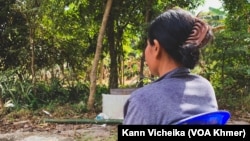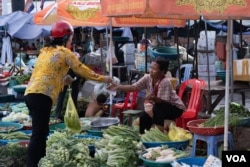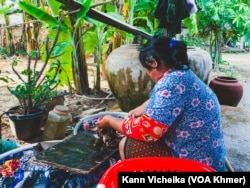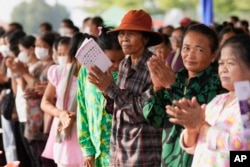When Sopheap married in 2018 she was happy to settle down and start a family with her husband, and she gave birth to a son soon after. But within a few years, her marriage descended into domestic abuse after her husband became an alcoholic.
She faced regular beatings and insults by her husband, who works as a rattan basket maker in Kampong Chhnang province, and often had to stay with relatives together with her son to avoid abuse.
“Sometimes… I feel like I've run out of emotions and am almost crazy. It has been very difficult,” said Sopheap, adding that she had kept her family together for her son’s sake.
“If he keeps using violence and does not change, I only have the choice to divorce,” said the thin 43-year-old, who broke down in tears during a recent interview with VOA Khmer at her sister’s house in the province.
Sopheap’s plight is not uncommon in Cambodia, where domestic abuse remains widespread. But women like her who wish to break free of abusive marriages face a range of cultural and legal barriers, while the law offers them weak protection, rights activists say.
Activists said that in Cambodia’s male-dominated and conservative society, physical and sexual violence against women and girls is often surrounded by a culture of silence and a tendency to find fault with victims.
Sothea, 50, from Battambang province, told VOA Khmer that she was raped when she was 18 years old by her brother-in-law, but she did not dare to file a police complaint because her family was ashamed and wanted to hush it up, while her father would not have been supportive as he often beat her mother. “In the evening I told my mother and she told me not to speak about it, saying: ‘If you tell your father he will beat me to death.’”
After her parents passed away in 2014, she tried to file a complaint at her local police office but was told it happened too long ago to open a case.
Traditions that tolerate domestic violence
The lack of protection is particularly pressing in cases of domestic violence, which is often seen as a private matter by the victim’s family members and law enforcement authorities, as Cambodian culture traditionally views wives as subordinate to their husbands.
Domestic violence is the most common form of abuse against women globally. A large 2015 study by UN Women and the World Health Organization found that some 20 percent of Cambodian women experienced physical and/or sexual violence by an intimate partner in a relationship or marriage; a third of women experienced emotional abuse. Rates were higher in rural areas and a third of the time children were present during incidents of violence.
“The reason many women continue to be subjected to all forms of violence is because Cambodia still has a patriarchal mindset, meaning that men are given more priority in [gaining] education than women, are considered to have more decision-making power in the family and are economically powerful,” said Norm Sina, community coordination manager of non-government organization called Gender and Development for Cambodia.
She added that children who witness domestic violence suffer severe mental health impacts.
The Chbab Srey, a centuries-old, traditional code of conduct for women that idealizes female submission to men and gender-specific roles in the household, was part of the official school curriculum until 2007 and still influences girls and women’s mindset and place in society, a 2018 Cambodian Center for Human Rights paper said.
A 2013 UN Women report found 98 percent of Cambodian women and 96 percent of men supported the idea that women should obey their husbands; 67 percent of women believed they should tolerate domestic violence to keep their families together.
In 2016, the then-U.N. Special Rapporteur for Human Rights in Cambodia criticized some local news reporting for lacking basic ethical standards, perpetuating gender discrimination stereotypes and normalizing gender‐based violence. This prompted the government in 2017 to issue a code of conduct for news reporting on violence against women.
Mediation instead of divorce or police complaints
Seng Reasey, executive director of gender equality NGO SILAKA, said because of conservative attitudes, victims are often unaware of their legal rights, while commune chiefs, police and courts usually encourage them to accept mediation solutions instead of filing for divorce or police complaints.
When authorities intervene, Seng Reasey said, “Solutions are generally limited because in some areas awareness of the legal framework is limited and knowledge of [the impact of] violence is still limited. They think it should be tolerated because it is a family affair. And in some cases, women victims are blamed [for abuse] for not doing the housework.”
These practices foster impunity and the reoccurrence of violence by perpetrators, she noted.
Sitha, a 50-year-old fishmonger at a market in Kandal Province with three children, one of whom lived with her, said she suffered threats and emotional abuse from her drug-addicted husband, but she had nowhere to turn for help after local police failed to respond to her requests.
“He always intimidates and insults me at home. In the worst case, he threatens me with an axe or knife… Sometimes, I almost suffocate and [feel like I] stop breathing” she said, adding that she still hoped for better as her husband recently entered drug rehabilitation.
Punishments are few
A 2017 paper by rights group Licadho—based on its consultations in 237 closed domestic violence cases in Cambodia that resulted in 12 deaths—found that about 30 percent of victims divorced, and 22 percent started a procedure that ended with criminal punishment. Some 43 percent returned to live with their violent partner, either through their own choice or mediation by commune chiefs, police and courts. The remainder of cases ended differently.
The 2005 Law on the Prevention of Domestic Violence and the Protection of Victims allows local authorities to mediate and to interpret whether violent acts are a felony or severe misdemeanor that should be prosecuted under the Criminal Code, according to Licadho.
The report said officials not only discourage divorce and police complaints because of conservative views, but also since “Local authorities and police are under-resourced, poorly trained and are in general unfamiliar with the law… In these circumstances it is just much easier, quicker and cheaper for local authorities to carry out reconciliations.”
Licadho added that many victims are also discouraged from pursuing justice because of Cambodia’s weak and corrupt court system.
Police force spokespersons could not be reached or said they were unable to comment on domestic abuse cases when contacted by VOA Khmer.
‘Cease law enforcement based on the old culture’
In the past decade, the Cambodian government has adopted several guidelines, national action plans and strategic plans to improve women’s rights that have been welcomed by activists as significant steps, yet they say more resources, legal training and stronger protection under law are required.
Seng Reasey said civil society groups operate support programs and hotlines for victims, while they have long campaigned to change attitudes in society and practices of police and the court system. They also advocated for amending the 2005 Law on the Prevention of Domestic Violence and the Protection of Victims to clarify and strengthen legal protection.
“Stakeholders must empower women and girls to understand their right to justice and to dare to report all abuses. These cases can only be dealt with effectively if the culture of blaming the victims is stopped, and… by ceasing emotional law enforcement based on the old culture,” she said.
Sar Sineth, deputy director general of the Ministry of Women’s Affairs’ General Department of Social Development, said her ministry had worked closely with civil society over the years to improve women’s rights, but acknowledged that law enforcement authorities need to be more protective of victims who file complaints against abusive partners.
“Providing support services entails responding to their needs and considering what they want. And most importantly, try not to blame the victim, because blaming the victim is one thing that puts the victim in even more danger,” Sar Sineth told VOA Khmer.
(Names of victims in this story have been changed to protect their identities.)









